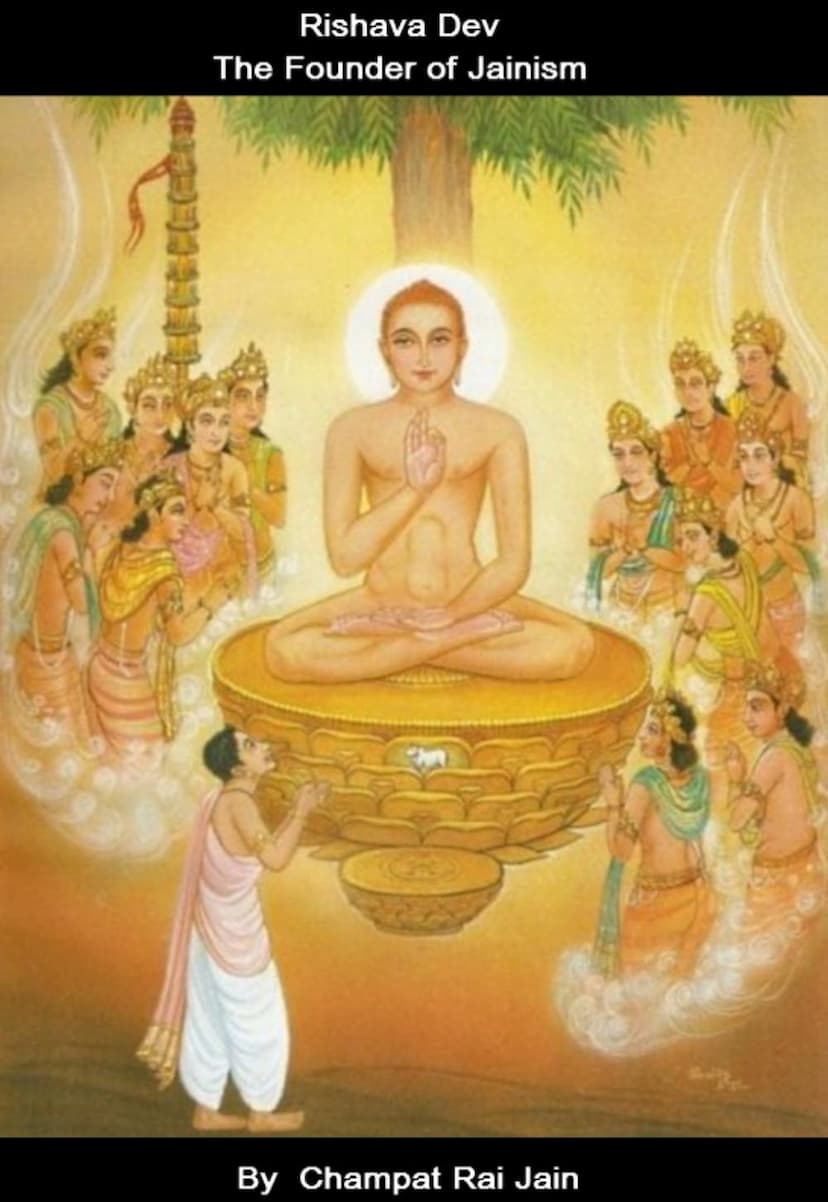Rishabhdev Founder Of Jainism
Added to library: September 2, 2025

Summary
Here's a comprehensive summary of the Jain text "Rishabhdev Founder of Jainism" by Champat Rai Jain, based on the provided pages:
Core Message and Thesis:
The book presents Jainism as a scientific religion founded by man, specifically by Rishabh Dev in the current cosmic cycle (Avasarpiṇī). It posits that Rishabh Dev, as the first Tirthamkara (World Teacher), established the principles of truth and spiritual liberation. The text argues that Jainism is the oldest and most scientific religion, and that other religions' mythologies contain fragmented truths derived from his teachings. The author emphasizes the cyclical nature of time, the law of karma, and the potential for human souls to achieve divine perfection (Nirvana) through rigorous self-discipline and ethical conduct.
Key Themes and Concepts:
- Rishabh Dev as the First Tirthamkara: The central figure of the book is Rishabh Dev, portrayed as the primordial spiritual guide who laid the foundation for Jainism. He is depicted as a historical figure who attained omniscience and Nirvana, and whose teachings have been re-affirmed by 23 subsequent Tirthamkaras.
- Religion as Science: A recurring theme is that religion is a science, grounded in facts and amenable to rational explanation. Jainism, in this view, is not based on divine revelation but on the scientific understanding of the soul and the universe.
- Human Potential for Divinity: The text strongly advocates that humans have the inherent capacity to become divine, achieving omniscience, immortality, and bliss (Nirvana). This is achieved through the cultivation of virtues and rigorous spiritual practice (tapascharana).
- No Creator God: Jainism, as presented here, rejects the notion of a creator or manager god. The universe operates under natural laws, and individual souls are responsible for their own destiny through karma.
- Transmigration and Karma: The book details the Jain concept of transmigration (reincarnation) driven by karma. Past actions influence future lives, determining one's state of existence in heavens, hells, or on earth. The goal is to break this cycle.
- Tirthamkaras as World Teachers: Tirthamkaras are described as perfected beings who appear periodically to re-establish the True Religion and guide humanity. There are 24 Tirthamkaras in each half-cycle of time.
- The Samavasarana: This is described as a divine preaching hall erected by deities for the Tirthamkara. It is depicted as a magnificent, divinely constructed structure where the Tirthamkara delivers sermons that are simultaneously understood by all present, regardless of language.
- The Jaina Calendar and Eras: The text alludes to the Jain cosmology with its cyclical nature of time (Avasarpiṇī and Utsarpiṇī) and different ages (kālas) characterized by varying degrees of human longevity, stature, and moral and spiritual development.
- Inter-religious Parallels: The author draws parallels between Jain teachings and those found in other religions (Hinduism, Judaism, Christianity), arguing that these similarities point to Jainism's antiquity and the universality of its core truths, often obscured by mythological interpretations in other traditions.
- The Lineage of Rishabh Dev: The text traces the previous lives of Rishabh Dev and his close associates, highlighting how virtuous actions in past lives lead to favorable rebirths and eventual spiritual progress. It also details his human family life, his sons (particularly Bharata and Bahubali), and their roles.
- Social Structure (Varna-vyavasthā): The book discusses the origin and purpose of the caste system, attributing its establishment to Rishabh Dev as a practical measure for societal organization based on occupation, not birth. It critiques the later Brahmanical interpretation and its later corruptions.
- Nirvana and the Siddhas: The ultimate goal is Nirvana, a state of perfect liberation from suffering, transmigration, and the cycle of birth and death. Siddhas (Perfected Souls) are described as having achieved this state, possessing omniscience, immortality, and eternal bliss.
Biographical and Historical Aspects:
- Rishabh Dev's Life: The book provides a detailed account of Rishabh Dev's life, from his conception, birth, childhood, marriage, public life, renunciation (Sannyasa), austerities, attainment of Omniscience, preaching in the Samavasarana, and finally, his Nirvana.
- Previous Incarnations: The narrative emphasizes the concept of past lives, detailing how Rishabh Dev and his companions progressed through various existences, accumulating merit and learning spiritual lessons.
- Bharata and Bahubali: These sons of Rishabh Dev play significant roles. Bharata is depicted as a great emperor and the first Chakravarti, after whom India (Bharatvarsha) was named. Bahubali is known for his immense strength and renunciation, eventually attaining omniscience.
- Historical Confirmation: The author argues that the historicity of Rishabh Dev and other Tirthamkaras is supported by references in ancient Hindu scriptures (Vedas, Puranas) and archaeological evidence, countering the view that Jainism originated much later.
Key Figures and Events:
- Rishabh Dev: The central figure, founder of Jainism.
- Maru Devi: Mother of Rishabh Dev.
- Nabhi Rai: Father of Rishabh Dev and a Kulakara.
- Bharata: Son of Rishabh Dev, a great emperor, credited with naming India.
- Bahubali: Another son, known for his renunciation and spiritual attainments.
- Vrisabha Sen: An Apostle (Ganadhara) of Rishabh Dev.
- The Samavasarana: The divine assembly for preaching.
- Nirvana: The final liberation of a soul from the cycle of birth and death.
- The Four Varnas: The societal division established by Rishabh Dev.
Author's Style and Tone:
Champat Rai Jain writes with conviction and a clear advocacy for Jainism. His tone is informative, often didactic, and aimed at establishing the scientific and historical validity of Jain principles. He engages in comparative analysis with other religions and philosophical systems, often highlighting what he perceives as the superiority and rational foundation of Jainism.
Overall Significance:
"Rishabhdev Founder of Jainism" serves as a foundational text for understanding the life and teachings of the first Tirthamkara within the Jain tradition. It presents a comprehensive theological, philosophical, and historical narrative, aiming to convince readers of the universal and scientific nature of Jainism. The book emphasizes the individual's journey toward spiritual perfection and liberation, grounded in ethical conduct, self-control, and wisdom.